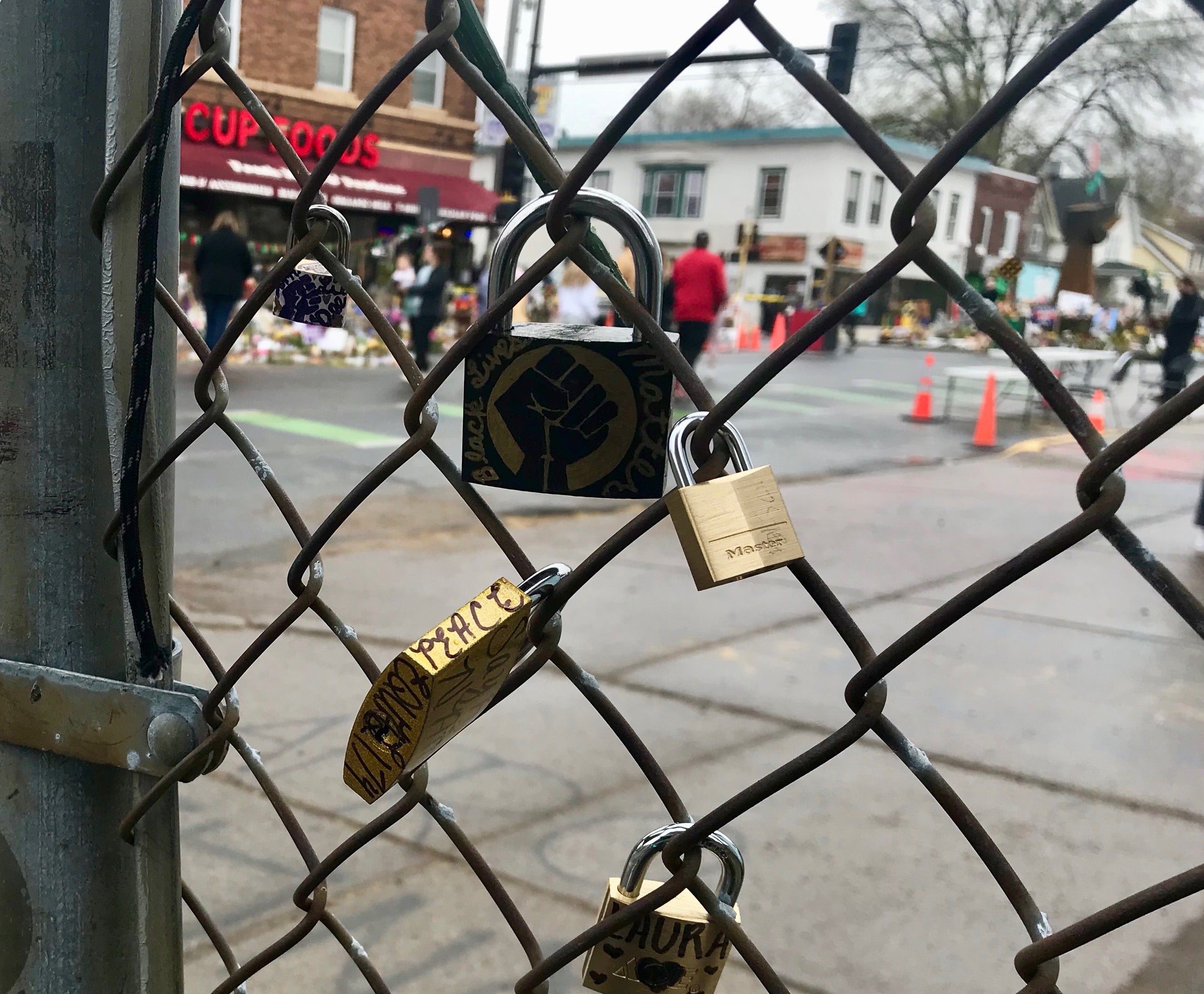Locking in a wish for racial justice in George Floyd Square
In the year since George Floyd’s murder, Americans have been protesting in many different ways, writes Andrew Buncombe


It was a simple enough request: feel free to charge your phone, but promise you’ll add a padlock to the protesters’ fence.
In the months since George Floyd was murdered by then-police officer Derek Chauvin, the people of Minneapolis have remembered the 46-year-old African American man in different ways.
There is the celebrated mural, a memorial in the shape of the fist. People leave notes and flowers at the site where he was killed.
And people have also been buying padlocks, clipping them to fences and barriers, and vowing that the lock will stay there, until the city of Minneapolis and the nation have secured racial justice.
On the day a Minneapolis jury found Chauvin guilty of second-degree unintentional murder, third-degree murder and second-degree manslaughter, I was in George Floyd Square, waiting for the news to come in. At around 2pm on Tuesday 21 April, we had been told the 12-strong jury had reached a decision over the 45-year-old officer, but at that point we did not know what it was.
When I arrived, my phone was only half-charged, and, knowing I was going to need to use it to take pictures and shoot some video of people’s reaction whichever way the jury came down, I went in search of a socket. (Note to self: remember the portable charger next time.)
The folks at the George Floyd Global Memorial could not have been more welcoming. The memorial, established in part of the Chicago Fire Arts gallery, has collected and curated more than 2,500 items left in the square by people: flowers, prayers, vinyl LPs. Earlier in the month, a volunteer had told me it was “an active space, an activity protest”.
So when I asked to plug in my phone, one of the people working there on what would be a momentous day, said, “Go ahead.” Her only request was that I buy a lock and add it to collection on a nearby fence. I promised I would.
A few moments later, the verdict came in – guilty on all counts – and people erupted in a combination of relief, happiness and exhaustion. There was also a lot of quiet anger; George Floyd was one Black man among hundreds to be killed by the police, and yet Derek Chauvin was just one of a handful of officers to be convicted.
I’ve been going to Minneapolis for about 20 years. My wife’s family lives there and I probably spend more spare time there than any other US city.
And so while I instinctively wish it well, I have doubts about whether it, or anywhere else in the United States, is going to secure racial justice any time soon.
In the summer of protests that followed George Floyd’s murder, some people talked about the need for healing. But healing implies a return to things as they were. In terms of racial justice, surely, the nation needs to move forward and grow, rather than return to things as they have been.
Many believe a move toward justice and equity must involve a true recognition of the US’s history – of the devastating impact of slavery, of the slaughter of indigenous Americans, of the decades of Jim Crow and white supremacy. Each continues to reverberate in different ways, but all have left communities of colour poorer, with less access to education and healthcare, and discriminated against by a criminal justice system.
Minnesota-based historian David Treuer is a member of the Leech Lake Ojibwe Tribe, and the author of The Heartbeat of Wounded Knee: Native America from 1890 to the Present. This month he has an article in The Atlantic calling for the US’s national parks to be placed in the management of indigenous communities.
“I don’t think you can ever sort of undo the past,” he said on PBS News. “But this country has a fundamental problem in its persistence in believing the myth of its own innocence vis-a-vis slavery and vis-a-vis the theft of Native land.”
Such clear-eyed leadership is what the nation needs. And it needs for white people to lead the change by accepting the role history has played in our collective primacy.
On the day I left Minneapolis, I went for coffee with a community organiser and comedian in north Minneapolis. I’d met her the summer before, when she was overseeing food distribution after several groceries were damaged in the protests following Floyd’s killing.
How were things going, I asked, for her and her daughter? “They’re good. Every day I try to do things better,” she said.
The coffee finished, I walked across the road to Dave’s Lock and Safe shop and paid $3.85 (£2.70) for a small brass-coloured padlock. I then drove to George Floyd Square, took out the padlock and carefully clipped it to the fencing. We can hope, but we also have to act.
Yours,
Andrew Buncombe
Chief US correspondent
Join our commenting forum
Join thought-provoking conversations, follow other Independent readers and see their replies
Comments